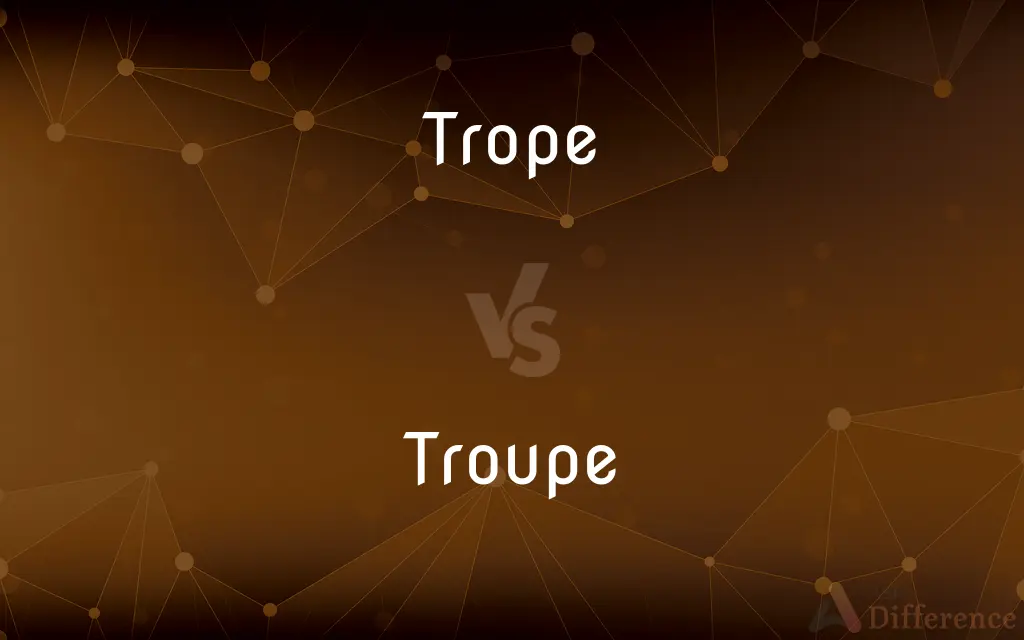Trope vs. Troupe — What's the Difference?

Difference Between Trope and Troupe
ADVERTISEMENT
Compare with Definitions
Trope
A figurative or metaphorical use of a word or expression
My sense that philosophy has become barren is a recurrent trope of modern philosophy
Perhaps it is a mistake to use tropes and parallels in this eminently unpoetic age
Both clothes and illness became tropes for new attitudes toward the self
Troupe
A group of dancers, actors, or other entertainers who tour to different venues
A troupe of singers
A dance troupe
Trope
A figure of speech using words in nonliteral ways, such as a metaphor.
Troupe
A company or group of actors, dancers, or other performers.
Trope
A word or phrase interpolated as an embellishment in the sung parts of certain medieval liturgies.
ADVERTISEMENT
Troupe
A company of, often touring, actors, singers or dancers.
Trope
A theme, motif, plot, or literary device that commonly recurs within a genre or work of fiction, especially when considered clichéd
“Finding the corrosion under the waxed-and-polished chassis of small-town America is itself an old trope” (James Poniewozik).
Troupe
Any group of people working together on a shared activity.
Trope
An often recurring idea or image
“In our conversations, there was a running theme, a trope, of economic havoc, of drowned cities, of time running out” (Jon Gertner).
Troupe
(intransitive) To tour with a troupe.
Trope
Something recurring across a genre or type of art or literature, such as the ‘mad scientist’ of horror movies or the use of the phrase ‘once upon a time’ as an introduction to fairy tales; a motif.
Troupe
A company or troop, especially the company pf performers in a play or an opera.
Trope
(medieval Christianity) An addition (of dialogue, song, music, etc.) to a standard element of the liturgy, serving as an embellishment.
Troupe
Organization of performers and associated personnel (especially theatrical);
The traveling company all stayed at the same hotel
Trope
(rhetoric) A figure of speech in which words or phrases are used with a nonliteral or figurative meaning, such as a metaphor.
Trope
(geometry) Mathematical senses.
Trope
A tangent space meeting a quartic surface in a conic.
Trope
(archaic) The reciprocal of a node on a surface.
Trope
(music) Musical senses.
Trope
A short cadence at the end of the melody in some early music.
Trope
A pair of complementary hexachords in twelve-tone technique.
Trope
(Judaism) A cantillation pattern, or one of the marks that represents it.
Trope
(philosophy) Philosophical senses.
Trope
(Greek philosophy) Any of the ten arguments used in skepticism to refute dogmatism.
Trope
(metaphysics) A particular instance of a property (such as the specific redness of a rose), as contrasted with a universal.
Trope
(transitive) To use, or embellish something with, a trope.
Trope
(transitive) Senses relating chiefly to art or literature.
Trope
To represent something figuratively or metaphorically, especially as a literary motif.
Trope
To turn into, coin, or create a new trope.
Trope
To analyse a work in terms of its literary tropes.
Trope
(intransitive) To think or write in terms of tropes.
Trope
The use of a word or expression in a different sense from that which properly belongs to it; the use of a word or expression as changed from the original signification to another, for the sake of giving life or emphasis to an idea; a figure of speech.
In his frequent, long, and tedious speeches, it has been said that a trope never passed his lips.
Trope
Language used in a figurative or nonliteral sense
Share Your Discovery

Previous Comparison
Lion vs. Dog
Next Comparison
Combined vs. Collective













































